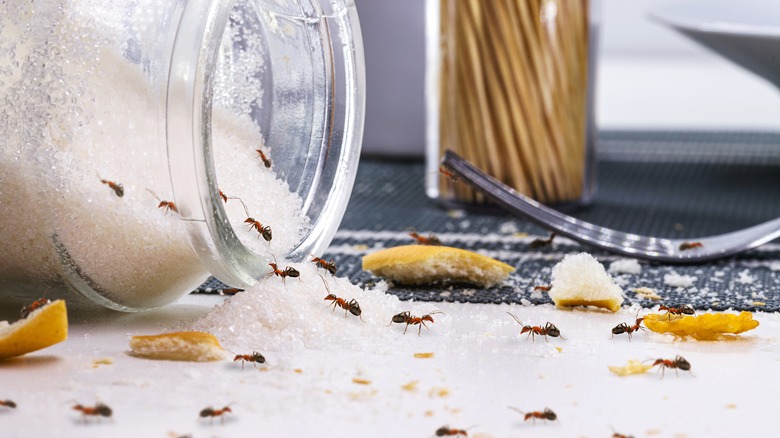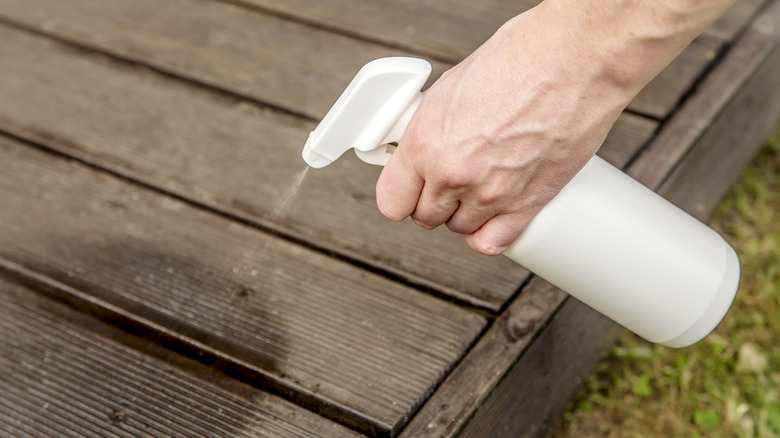The Fresh-Smelling Scent That Fights Off Ants Naturally
We may receive a commission on purchases made from links.
Ah, the seemingly unending war with ants. The uninvited, six-legged parade that embarks on your spotless kitchen countertop can be more than a mere inconvenience. Understandably, instant thoughts of brandishing cans of potent, synthetic insecticides could be crossing your mind. But why gamble with your health (and possibly budget) when an eco-friendly, fresh-smelling weapon is at your disposal? Enter lemon eucalyptus oil. The ants, operating in a complex system of scent cues used for communication, feeding, and alarm systems, find the aroma of lemon eucalyptus oil fiercely repulsive. Yet, keep in mind, there's a distinction between lemon eucalyptus oil and the oil of lemon eucalyptus (OLE).
Our ant-repellent recipe hero is extracted from an Australian native known as lemon-scented gum (Corymbia citriodora). Contrary to what its name and lemony scent suggest, this tree doesn't belong to the citrus family but to the myrtle family. Lemon Eucalyptus oil contains faint traces of p-menthane-3,8-diol (PMD), one of the ingredients behind the strong scent that sends ants packing. Refine this oil further by elevating PMD levels and trimming down citronella content, and you end up with the oil of lemon eucalyptus (OLE). One supremely attractive aspect of this essential oil ant-deterrent hack is its more refreshing blend of cost-effectiveness and safety. Now, let's walk you through harnessing this product to repel ants naturally and fragrantly.
How to ant-proof your home with lemon eucalyptus oil
It's crucial to know where to strike first; your best bet would be to target ant entry points such as door and window frames, baseboards, and cracks in walls or foundations. Don't overlook the ant scent trails, though. You see, ants cleverly lay down an invisible pheromone path, leading their comrades straight to the food sources, facilitating a well-organized intrusion. Targeting these trails is another master stroke.
So, how do you unleash the lemon eucalyptus essential oil anti-repellent recipe? Begin with gathering your bottle of lemon eucalyptus oil, water, and a spray bottle. Oil Prima Lemon Eucalyptus Essential Oil, boasting a 4.3/5 score from 51,200+ ratings on Amazon, is a superb contender. A measure of 10 to 15 drops of the essential oil in a cup of water, then shaken vigorously, should do the trick. Now, like a medieval knight protecting his castle, bombard those ant-frequented areas in your home with your refreshing but deadly-against-ants brew. Repeat the treatment until all the invaders retreat.
Alternatively, arm your home with lemon eucalyptus oil-infused cotton balls, strategically placing them near ant entrances like miniature guards on patrol. Begin with three to four drops of the oil, refreshing your fluffy guardians every day or two. Don't hesitate to replace or soak the cotton balls with more oil if the ants continue their onslaught. Out of cotton balls? A piece of cloth will suffice in your quest to reclaim your territory from the ants.
Caveats for lemon eucalyptus oil anti-repellent recipes
Direct application of lemon eucalyptus oil in ant-infested locations is a recommended alternative. But don't forget that the concentrated form of the oil can leave you with undesirable skin irritation. Our recommendation? Gloves. Engaging a diffuser to disperse the oil could be another valid strategic move. It doesn't only wage war against ants but also adds a hint of a refreshing aura to your home. You could also enlist typical housekeeping chores as silent warriors in this battle. For example, a mop drenched in a water-and-essential-oil solution can do the trick. Caution: According to petMD and WebMD, cats and dogs can suffer unpleasant symptoms due to ingestion, inhalation, or casual contact with essential oils. Remember, the objective is to repel ants naturally, not to trade them with the comfort of your beloved pets.
Thinking of other alternative natural repellents for ants? Worthy recommendations include white vinegar, peppermint plants, lemon peels, coffee grounds, and diatomaceous earth. Essential oils from cinnamon, cedarwood, peppermint, clove, lavender, tea tree, and lemongrass are among the diverse substitutes of lemon eucalyptus oil ant repellent. How about prevention, you ask? Well, ants follow scents from food residuals in recycling bins, trash cans, and even your pet's food bowls. Much like removing a plot twist in a story, regular washing of these items and cleaning food crumbs around your house might be the most decisive move in keeping those intruders out.


